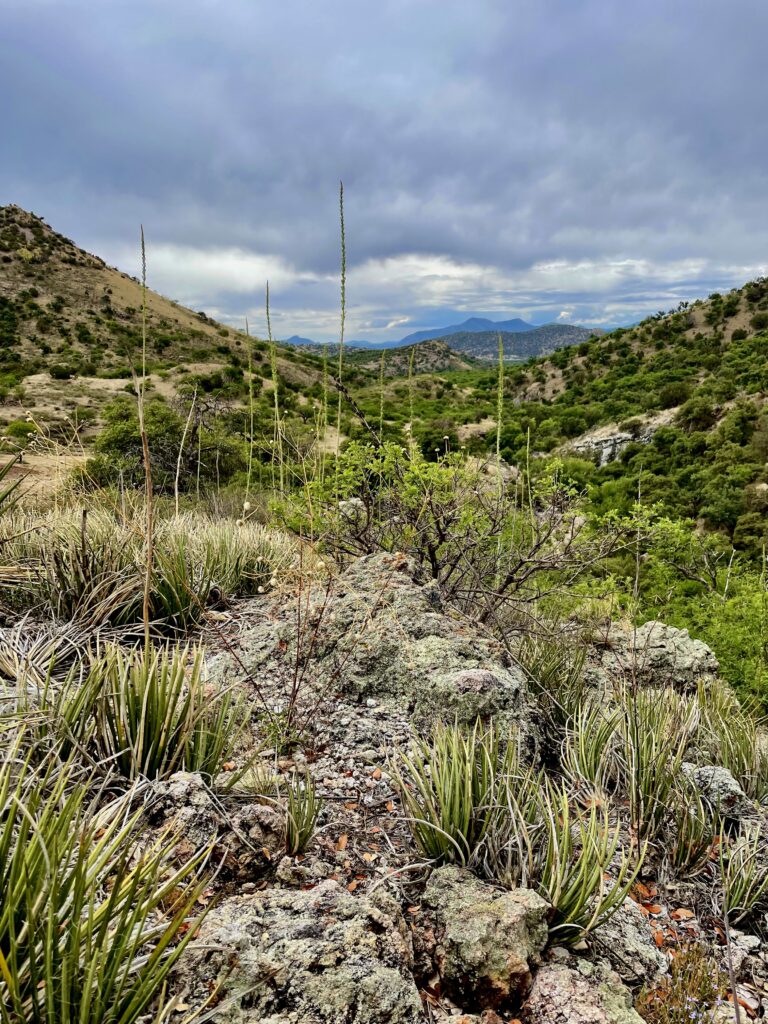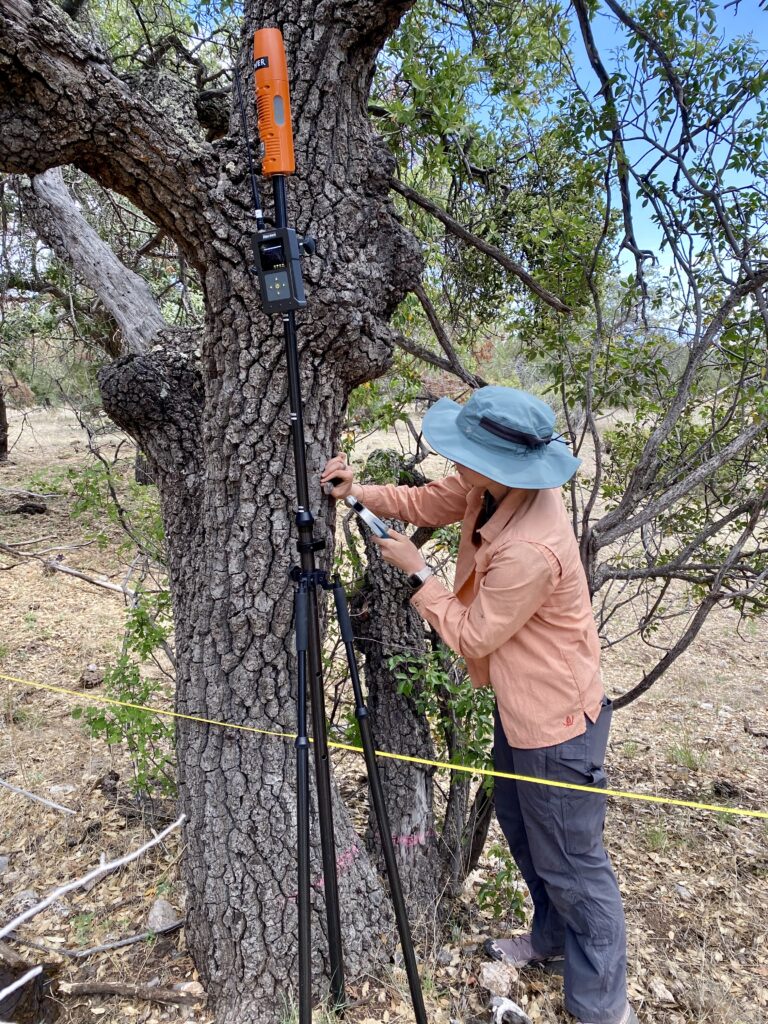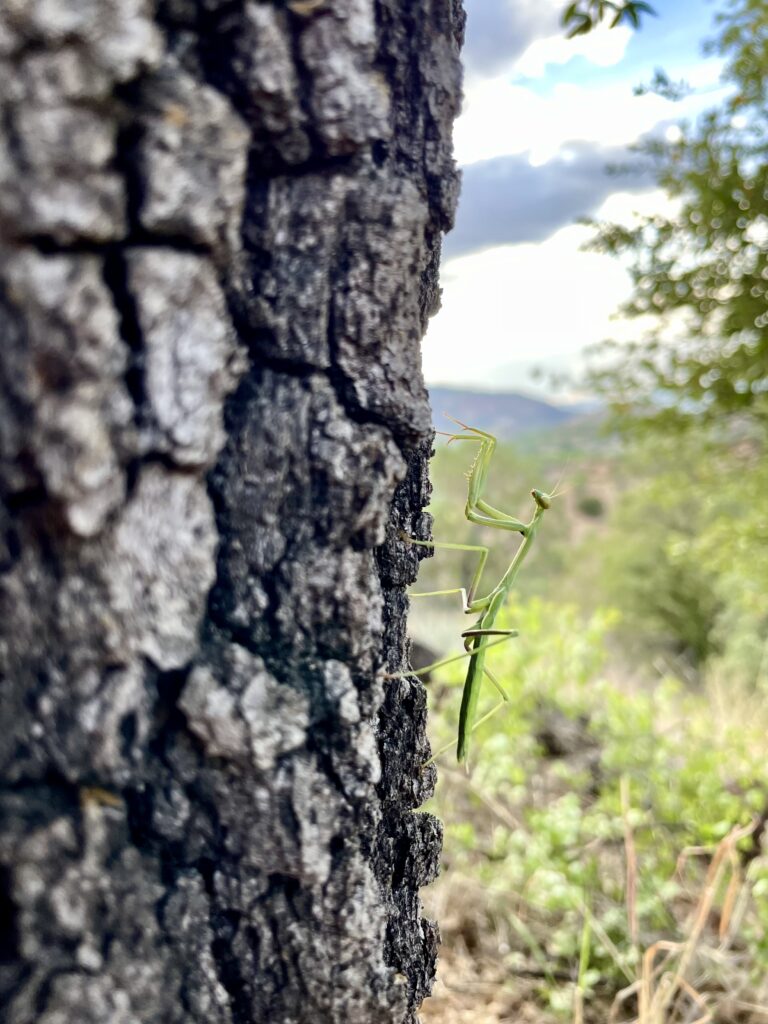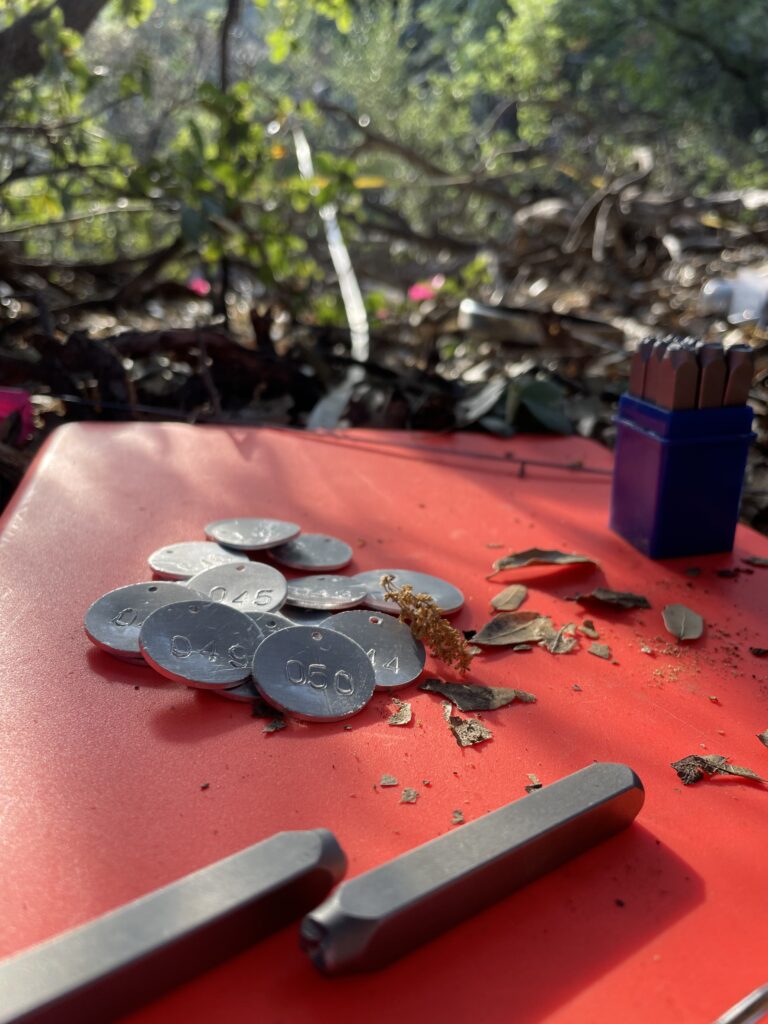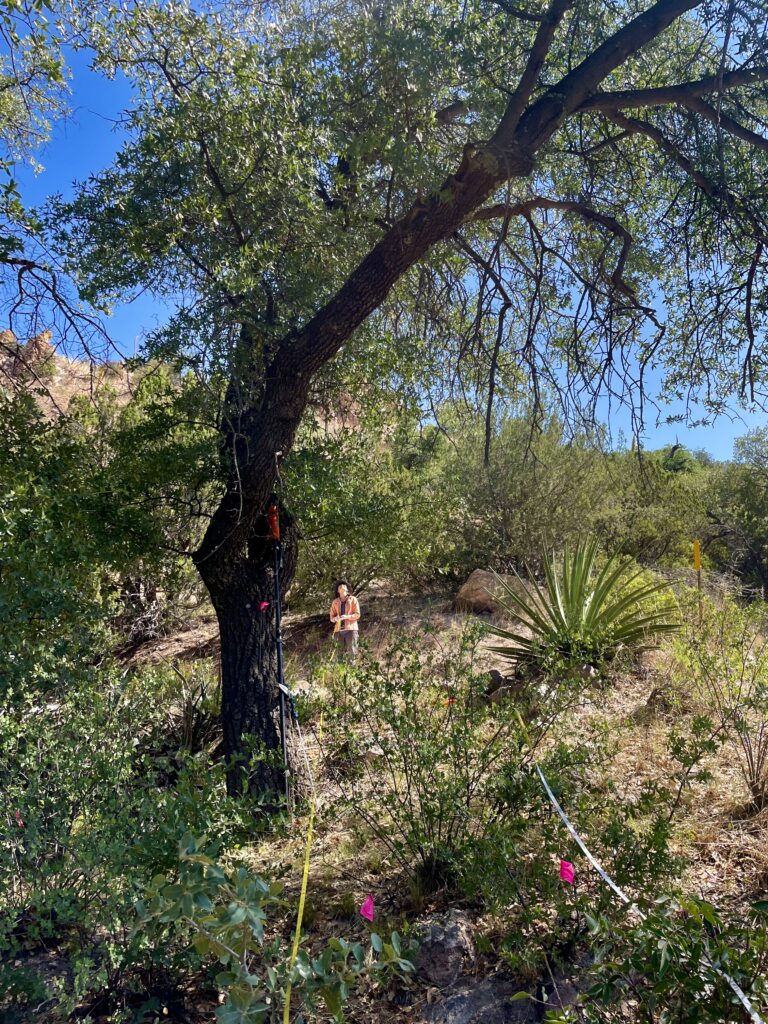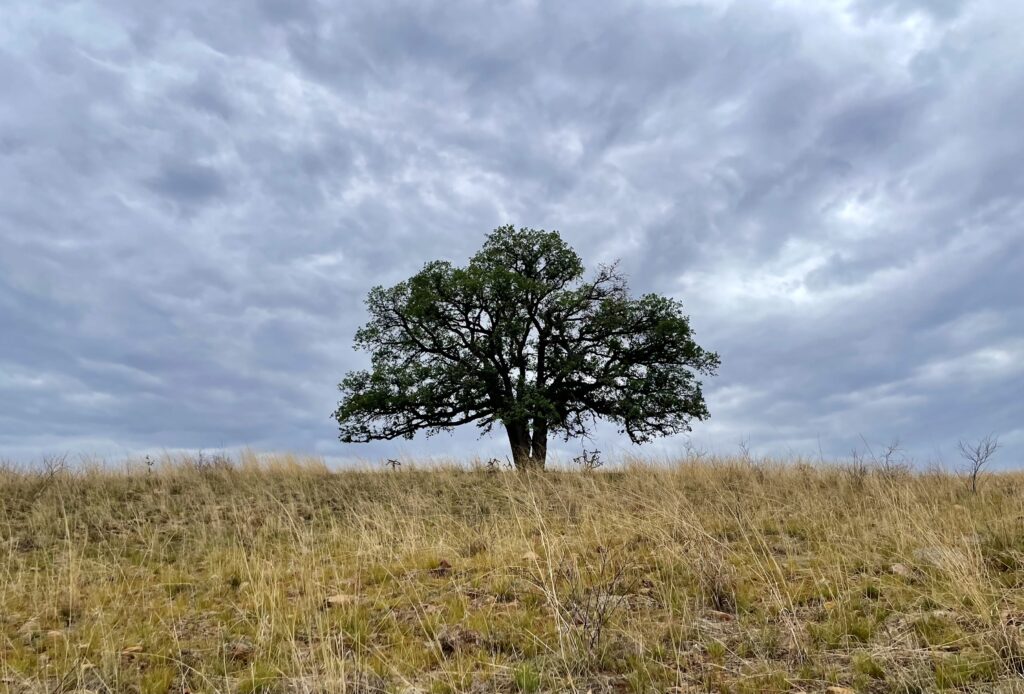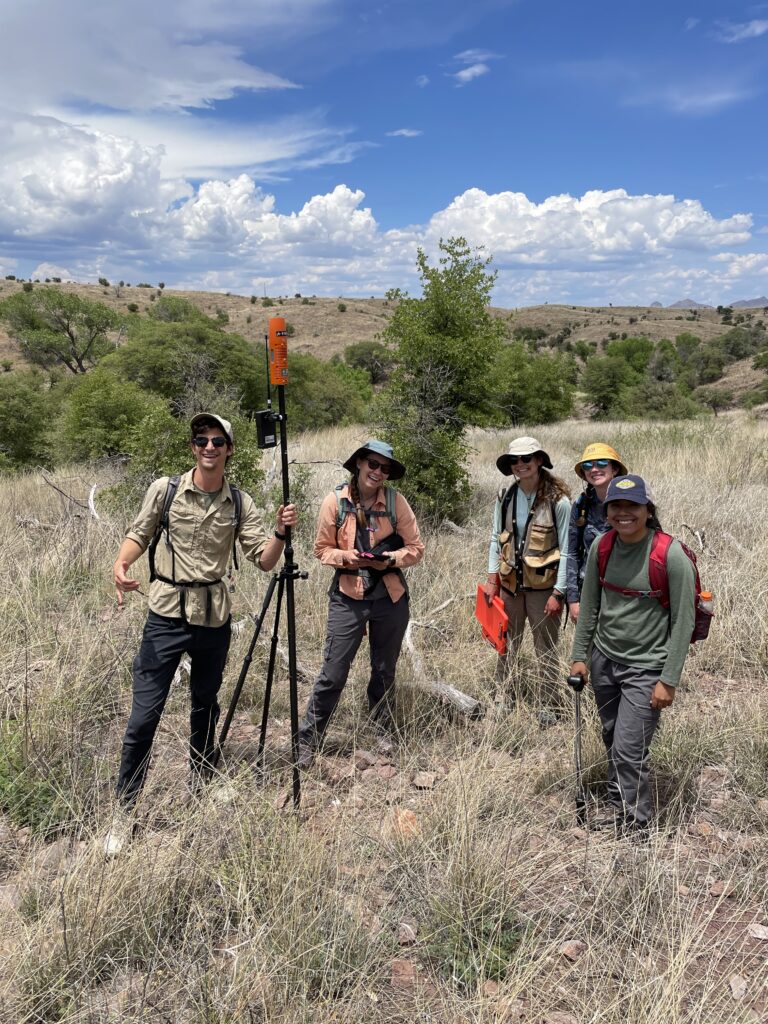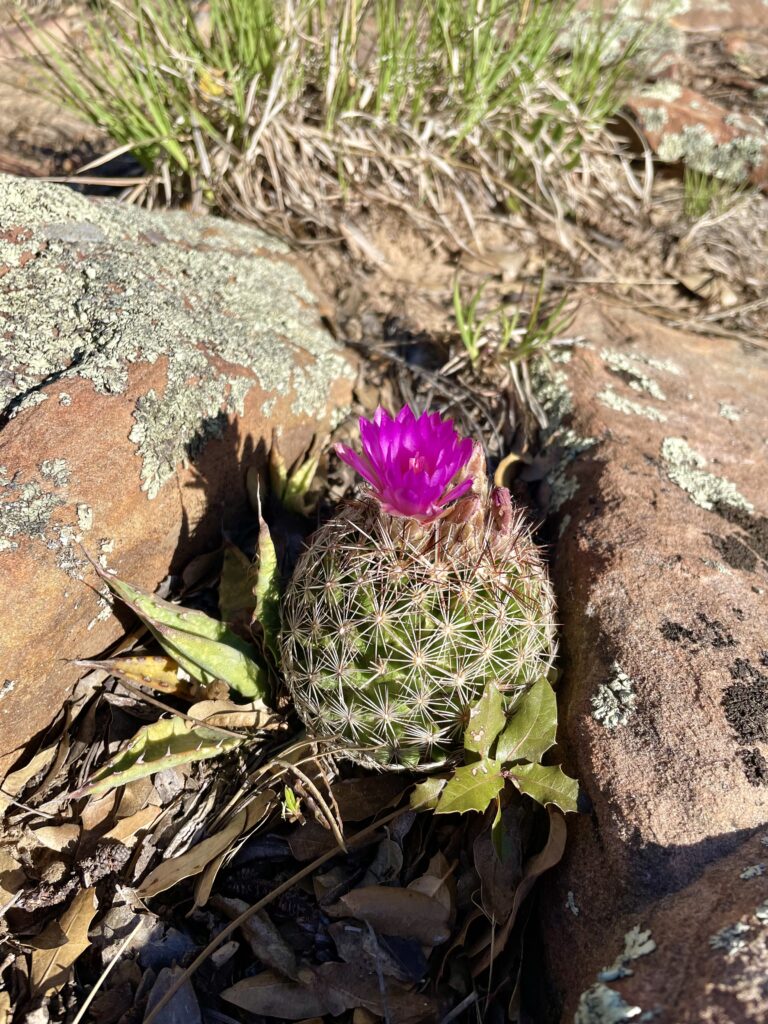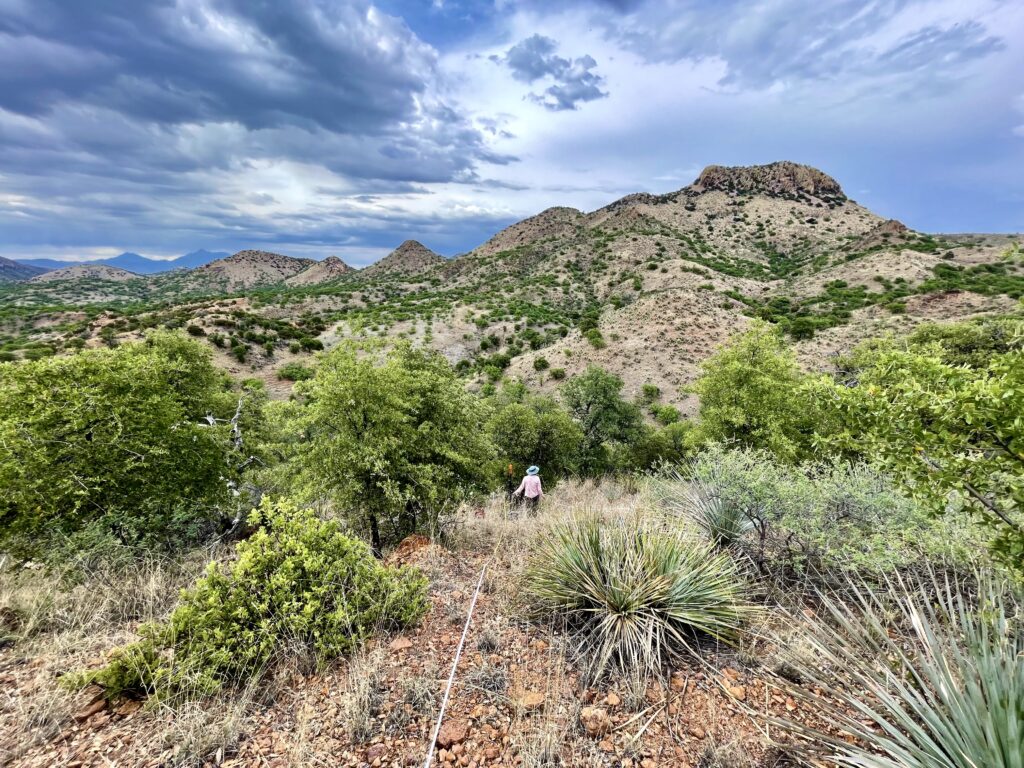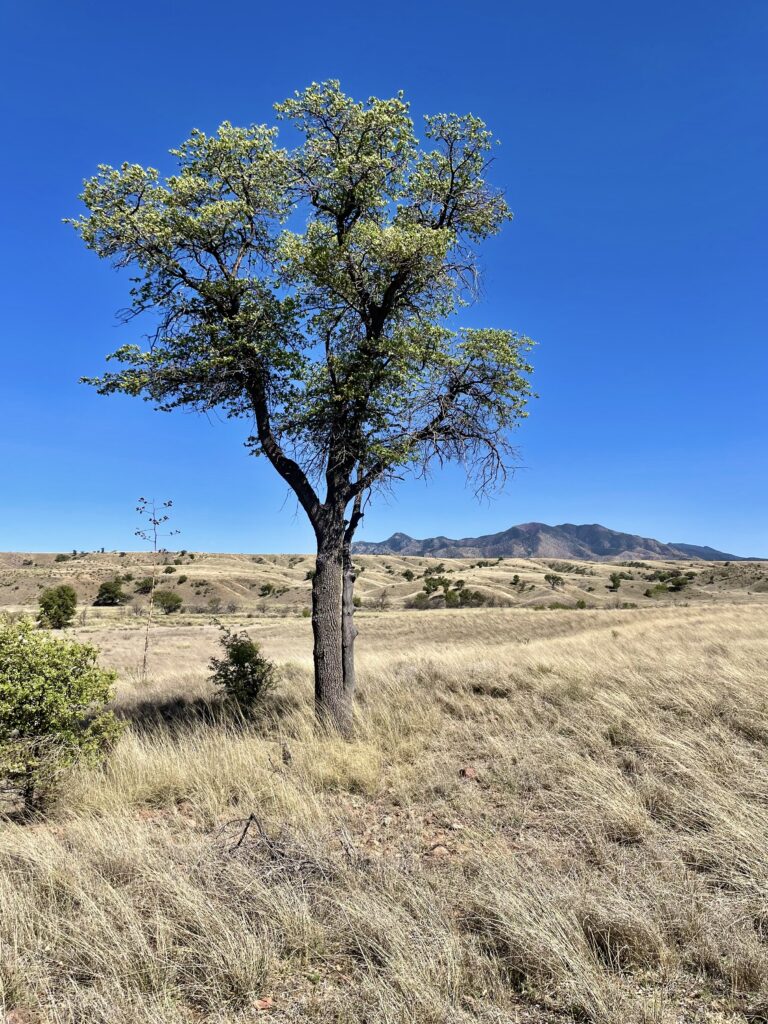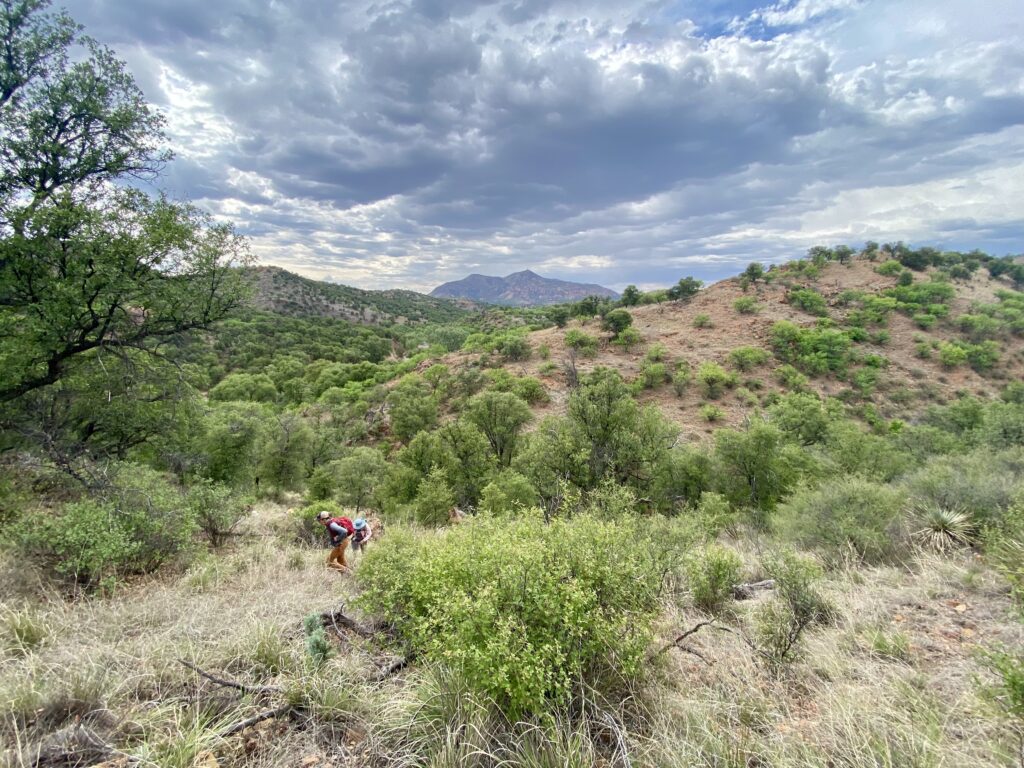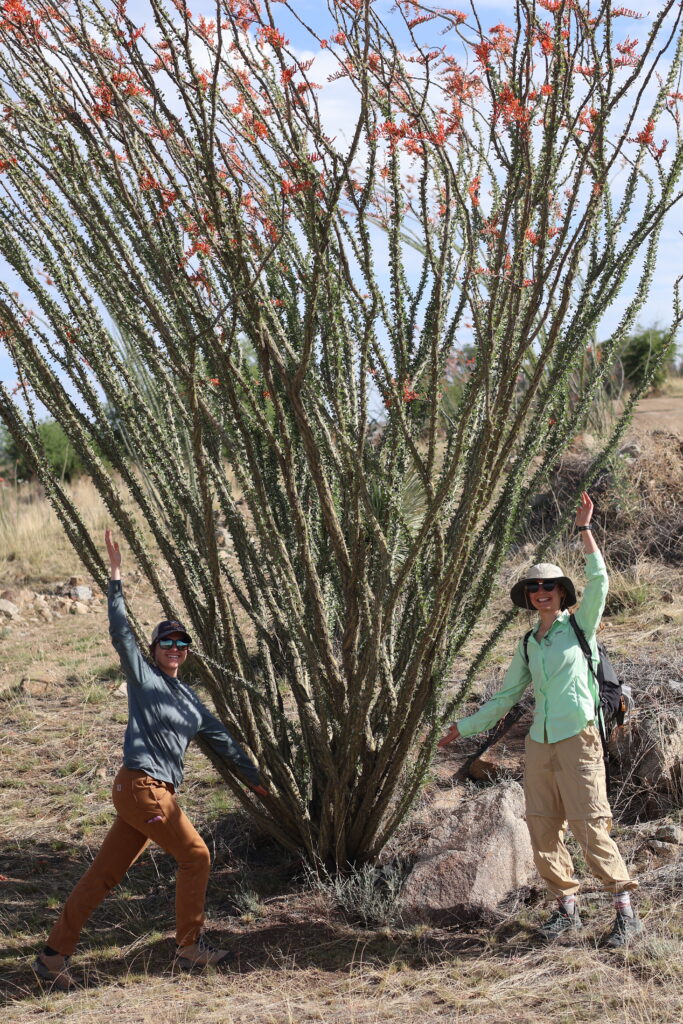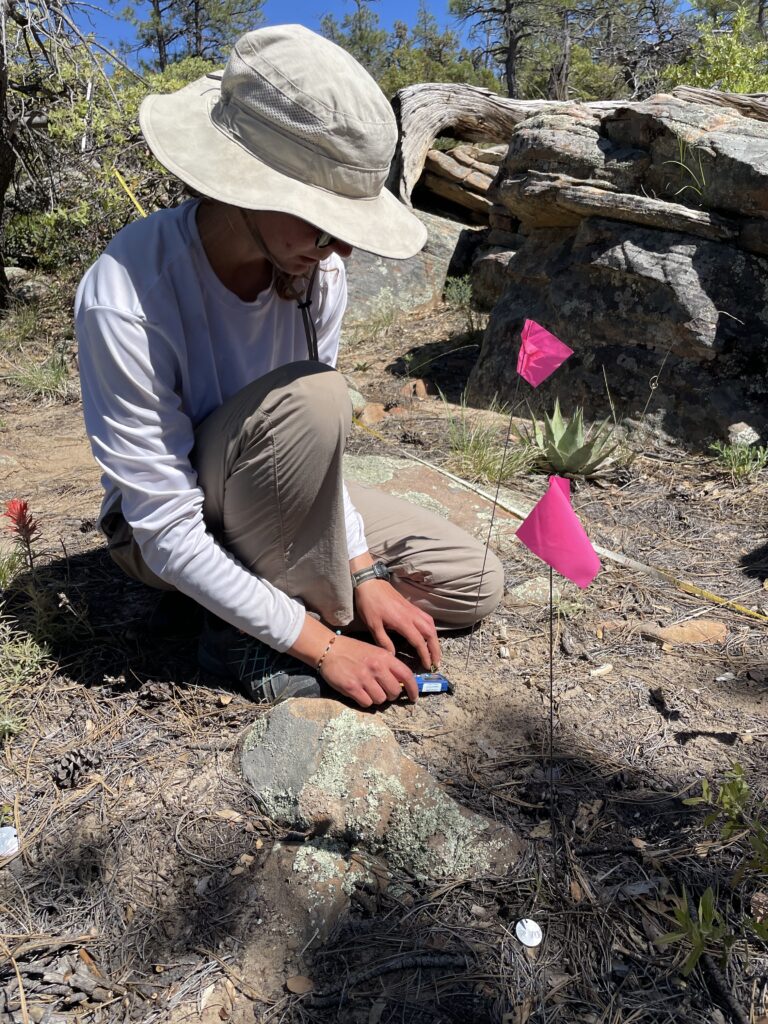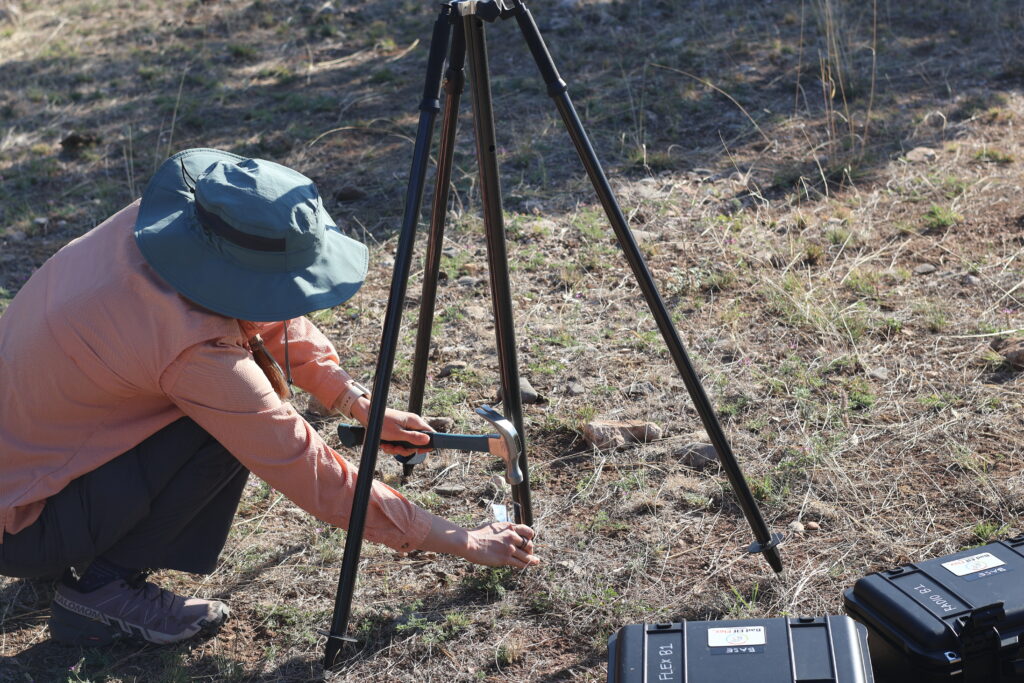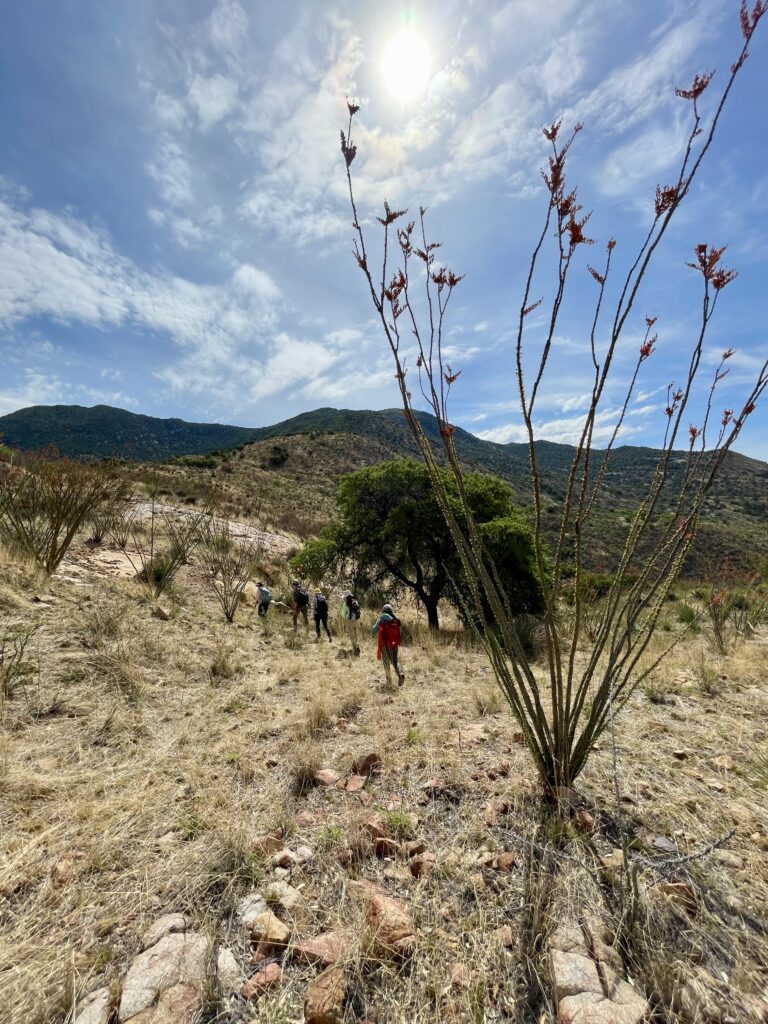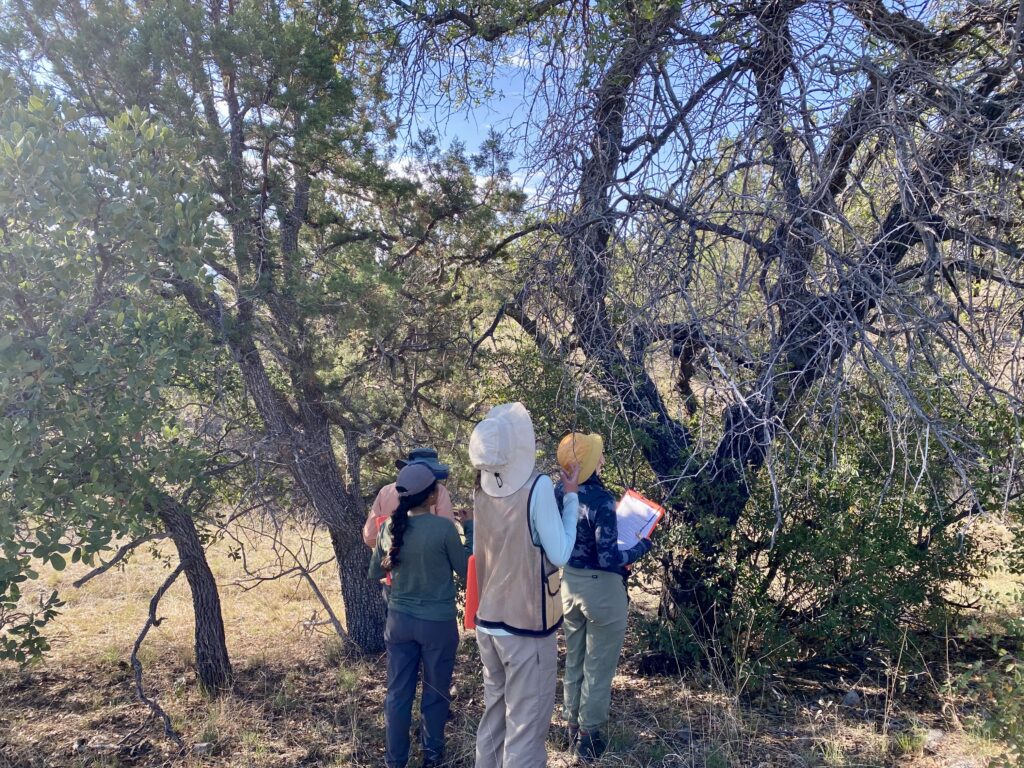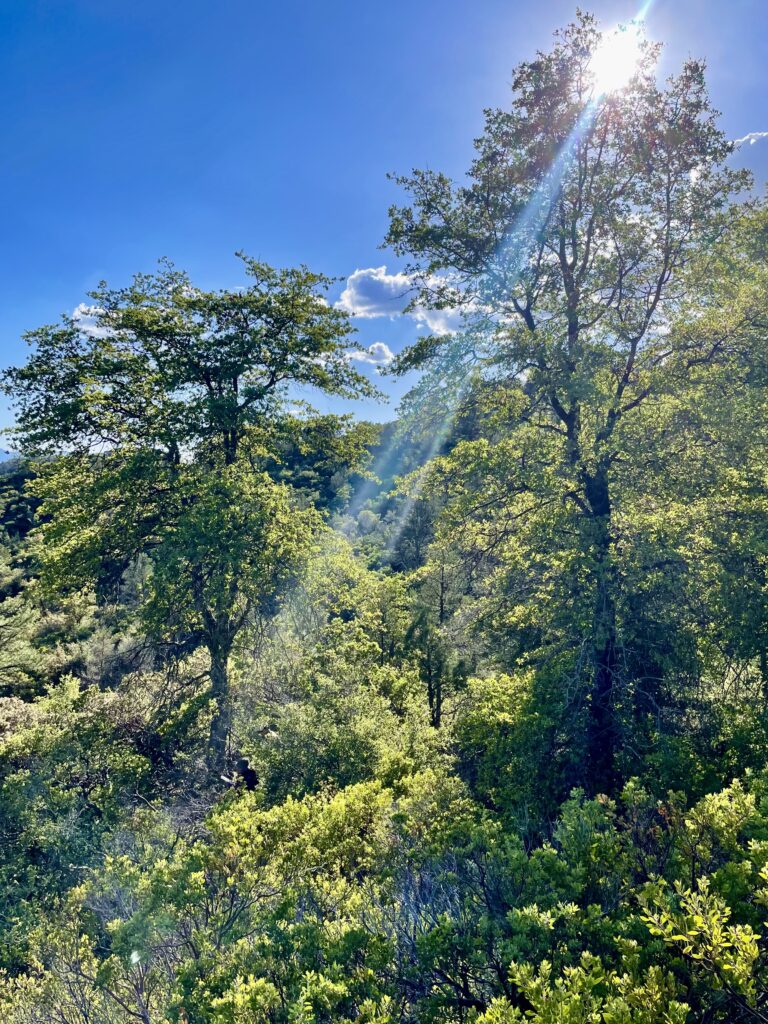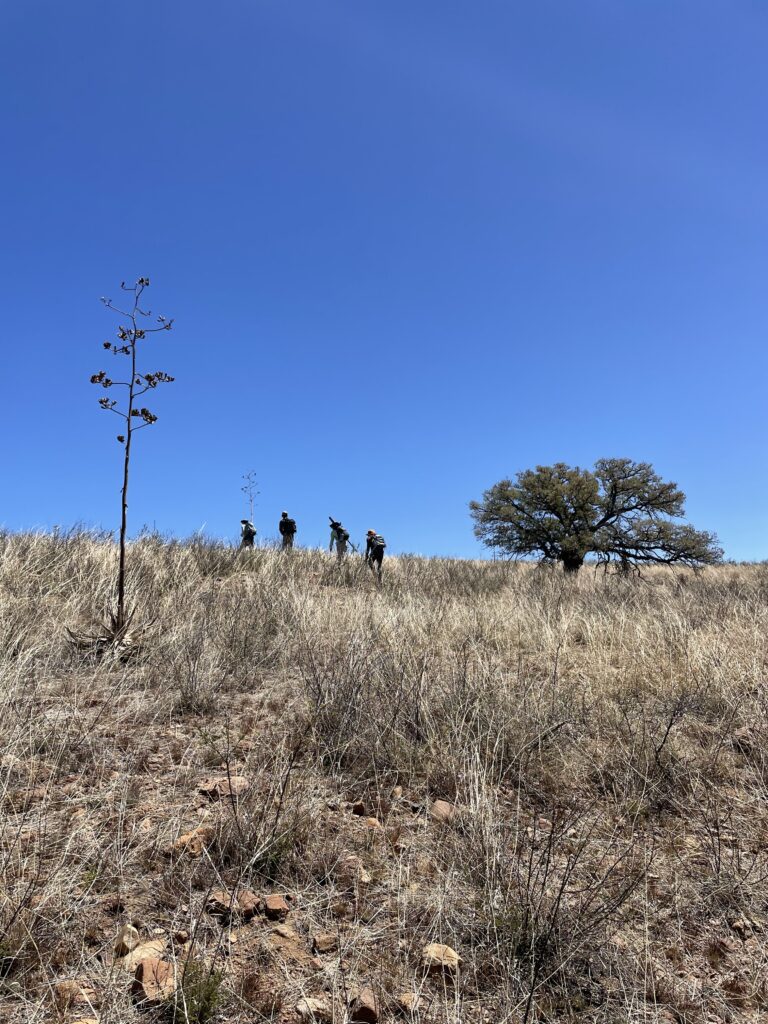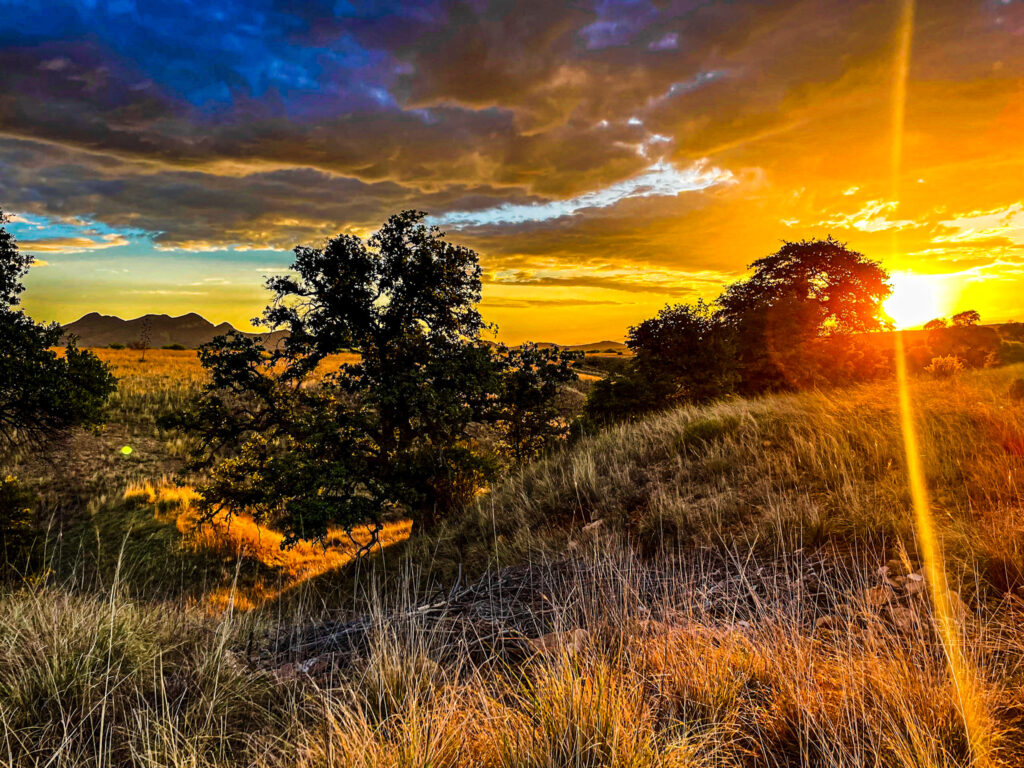
For many Native American communities, spiritual and cultural activities rely on natural resources that provide food, dyes, medicines, and materials for traditional crafts. In the southwestern US, western Apache people use Emory oak acorns (Chi-chil) to cook traditional or ceremonial foods. For thousands of years, Apache Tribes managed key processes in oak woodlands, moving acorns around the landscape, shaping fire patterns, and hunting wildlife that feed on acorns and young plants. Similarly, oak forests supported cultural practices, provided nutritious food, and encouraged families to meet, giving elders the opportunity to teach new generations about traditional life ways. For these reasons, the health of both Apache communities and oak woodlands are linked. The relationship between western Apache Tribes and Emory oaks was disrupted after most Apache people were moved to reservations in the 1800s. Now, Emory oaks are declining due to factors like drought, which are increasing in severity due to climate change. At the same time, fewer young Apache Tribal members harvest acorns than in the past. By examining patterns hidden in the DNA and tree rings of Emory oak, combined with the knowledge of tribal elders, researchers, and tribal members piece together key aspects of the traditional relationship between Apache people and oaks. Lessons from the past combined with an understanding of modern oak woodlands allows researchers to develop strategies to better conserve oaks, and in doing so, support Apache traditions related to acorn harvest. The project will contribute to the training of Indigenous scholars by reaching out to undergraduate interns and graduate fellows at historically Indigenous learning institutions. Broder impacts will also arise from a novel mentorship program that includes Tribal professionals and/or elders on student advising teams to foster a supportive learning environment, increase student retention, and integrate traditional ecological knowledge into western scientific knowledge frameworks. The research will support tribal youth initiatives and intergenerational knowledge transfer, and it will curate sociological and ecological information to ensure persistence of regional Indigenous knowledge.
For thousands of years the Apache people influenced the oak ecosystems, by moving acorns around the landscape, altering patterns of disturbance like fire regimes, and affecting wildlife consumption of acorns and seedlings. When Apache communities were relocated onto reservations, traditional management and knowledge of these oak woodlands was largely lost. Today, oak populations are declining, and fewer Apache youth practice traditional harvest. In the case of Emory oaks, climate change drives habitats to cooler or wetter areas, sometimes away from tribal lands, and intensifies disturbances like drought and fire that can destroy traditional gathering sites. To address this problem, this research reconstructs key components of the past Emory oak-western Apache system using Apache oral history and ecological messages from the past. Ecological Data will be collected from tree rings and genetic sampling. The researchers will integrate this historical information into models, in combination with data describing current ecological function and cultural practices using multi-paradigm modeling techniques. These analytical methods will integrate social and ecological variables, flows, and feedbacks within complex socio-ecological systems and advance socio- ecological modeling, which necessitates the incorporation of disparate data types into quantitative frameworks to explore emergent system properties.
The NAU Review – Plant ecologist awarded NSF grant for restoring the culturally important Emory oak
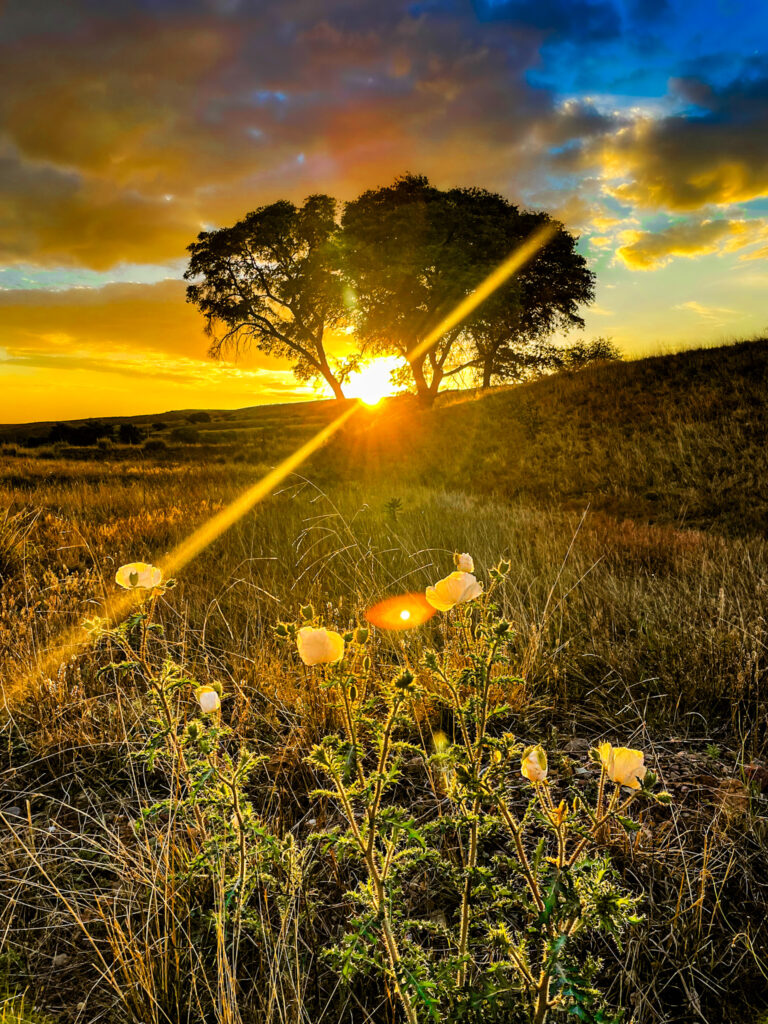
Photo by: Morgan Andrews
Journal Articles
- Souther, S., Columbo, S. and N. Lyndon. 2023. Integrating traditional ecological knowledge into US public land management: Knowledge gaps and research priorities. Frontiers in Ecology and Evolution, 11, 27. https://doi.org/10.3389/fevo.2023.988126
Field study
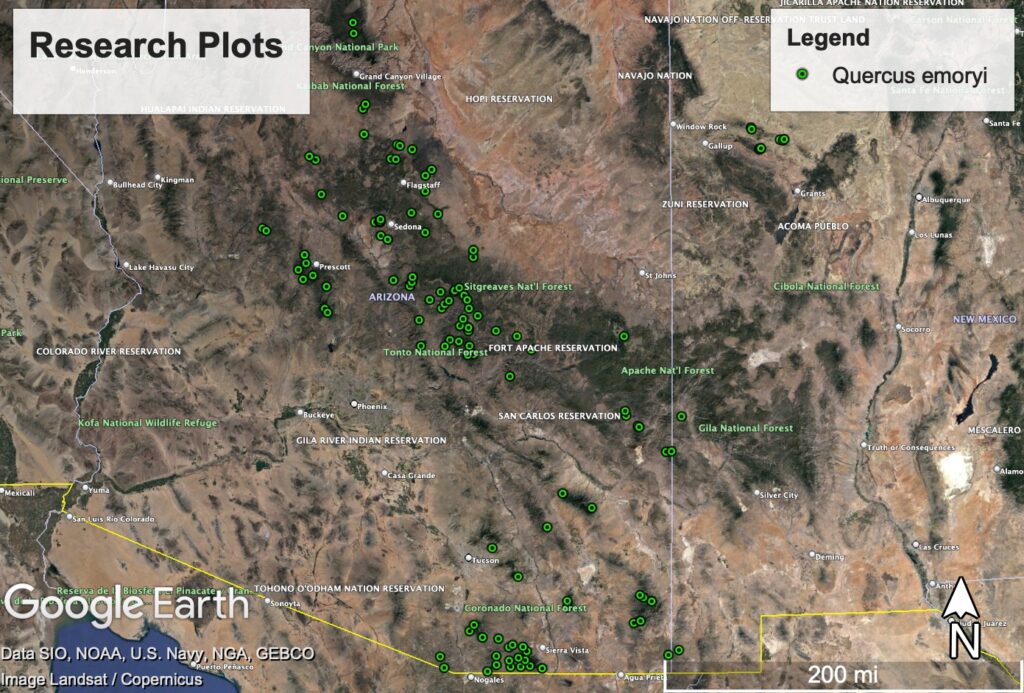
Partnerships
EOCTRI: Emory Oak Collaborative Tribal Restoration Initiative
Mission: Restore and ensure the long-term persistence of Emory oak (Quercus emoryi Torr.) and other traditional subsistence foods for present and future generations. Emory oak trees are not replacing themselves, “because of what humans have done to the land.” The EOCTRI seeks to mitigate the impacts of human influence on the environment to provide a safe environment for young trees to come back.
“Acorns, eagles, and otters are an indication of environmental health to the Apache people. . . Chí’chil (acorns) are the single most important traditional food today. Chí’chil are vital to almost every Ndee social and ceremonial function…–
This is more than a project. It’s an opportunity for each and every one of us to learn about something new and how to do it. But, more than that, we are all on a spiritual journey, that’s how important these trees are. Whenever we visit them, we give thanks to the Creator, they are here for us, because of the Creator. We must approach this work with respect and reverence in order to be successful. If we do it wrong, we risk offending the Creator, and everything can be taken away.” – Vincent Randall, Yavapai-Apache Nation
“Anything we do as Ndee people is geared toward improving the world for Apache children that are here and yet to be born” – Victoria Wesley, San Carlos Apache Tribe & Arnold Beach, White Mountain Apache Tribe
Goals: The Emory Oak Collaborative Tribal Restoration Initiative (EOCTRI) seeks to: identify, restore, and protect Emory oak groves and other culturally utilized plants that co-occur in these groves; learn about Emory oak, including best practices for co-management and restoration; incorporate Indigenous Traditional Ecological Knowledge (ITEK) into research efforts, treatments, and decision-making; reconnect tribal communities to ancestral lands; influence forest management practices for a broader impact; increase grove resilience to natural disturbances and changing climate; improve watershed function to ensure viable habitat sustainability; support tribal training, employment, capacity building, and youth education; and provide opportunities for elders and youth to share their cultural traditions.
Links to relevant articles
https://westlandresources.com/wp-content/uploads/2021/11/EmoryOaksNewsDecember2020_final.pdf
Principal Investigators
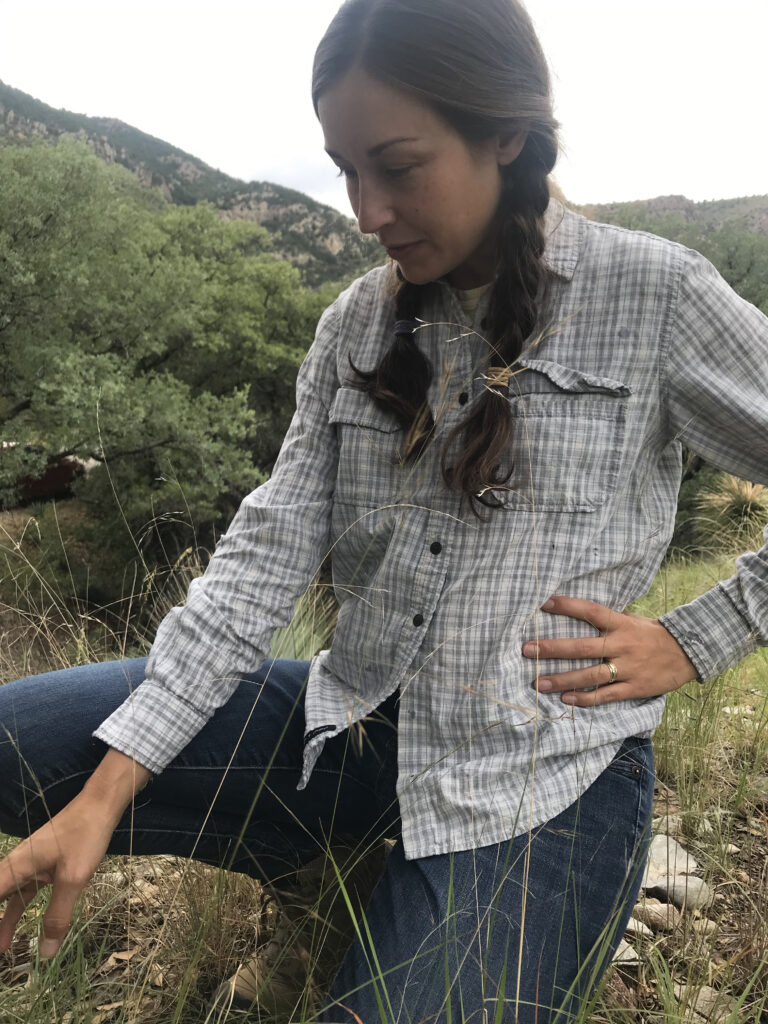
Sara Souther (she/her)
Assistant Research Professor, School of Earth and Sustainability
Core member, Center for Adaptable Western Landscapes, Northern Arizona University
Key research themes: Plant population ecology, ethnobotany/Traditional Ecological Knowledge (TEK), global change biology
Dr. Souther is a plant ecologist and conservation biologist, who studies the structure and dynamics of human-environment interactions. Dr. Souther uses a variety of tools, including demographic and spatial modeling, experimental plantings and common garden construction, and innovative statistical analysis to identify behaviors or management structures that promote resilient ecosystems. The long-term mission of this multidisciplinary and collaborative work is to provide information to conserve ecological systems, as well as the diversity of human interactions with these systems, in a time of rapid anthropogenic change.
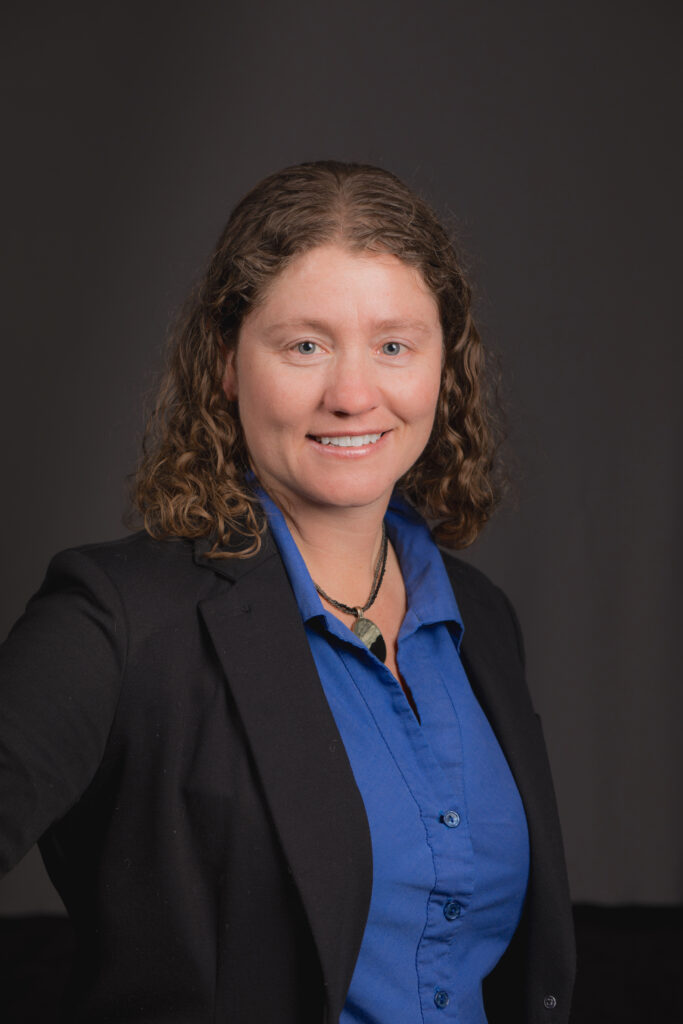
Clare Aslan (she/her)
Associate Director and Associate Professor, School of Earth and Sustainability
Co-Director, Center for Adaptable Western Landscapes, Northern Arizona University
Dr. Clare Aslan is a community ecologist and conservation biologist, interested in the ecology and conservation of species interactions and how dynamics at the interaction level can scale up to the full community level. She is passionate about solutions-oriented research. Dr. Aslan’s research interests include the community implications of species interaction disruption via climate change and biological invasions, as well as the effects of environmental change on coupled natural-human systems. Clare obtained her PhD from the University of California, Davis, and completed a Smith Conservation Postdoctoral Fellowship at the University of California-Santa Cruz.

Alark Saxena (he/him)
Assistant Professor, Northern Arizona University
Alark’s primary interests are in poverty alleviation, sustainability of natural resources and developing resilient communities. Alark uses an interdisciplinary approach to environmental problem solving. He has used a systems approach for developing novel techniques to evaluate resilience of local communities and model relationships between forests landscapes and rural communities.
Currently, Alark is working on measuring resilience of flood affected communities between India and Nepal, evaluating the impact of tourism on the natural and social systems in Sagarmatha National Park in Mt. Everest region in the Himalayas and developing an integrated landscape and livelihood management decision support system for forests in Turkey and India. Recently, Alark’s team has been awarded a 3 year long NASA project for identifying vulnerable communities living across Himalayas in India, Nepal and Bhutan.

Diana Stuart (she/her)
Associate Professor, Northern Arizona University
I am an environmental sociologist and my work focuses on identifying drivers of environmental problems, examining possible solutions and alternatives, and exploring pathways for positive social transformation.
I am an Associate Professor at Northern Arizona University with a split appointment in the Sustainable Communities Graduate Program and in the School of Earth and Sustainability. My research continues to focus on climate change, biodiversity conservation, animal studies, social theory, agriculture, and water. Please see my publications for specific research topics and foci.
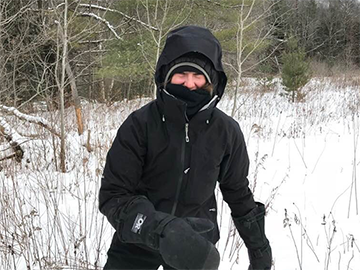
Amy Whipple (she/her)
Associate Professor and Associate Chair, department of Biological Sciences, Center for Adaptable Western Landscapes, Northern Arizona University
Amy Whipple is a core member of the Center for Adaptable Western Landscapes. She is also an associate chair and an associate professor in the Department of Biological Sciences. Amy’s area of interest is evolutionary ecology, with a current focus on plant adaptation to drought, cold, and climate change. She is also interested in the ways genetic architecture and evolution interact. Amy has led efforts to develop field research facilities, including the Southwest Experimental Garden Array and the Merriam-Powell Research Station. Having mentored too many undergraduate students to count, Amy has a long-standing interest in both graduate and undergraduate student research training. Through her work on NAU’s Research Experiences for Undergraduates program and in collaborations with Steve Chischilly at Navajo Technical University she seeks to learn from indigenous students, faculty, and land managers.
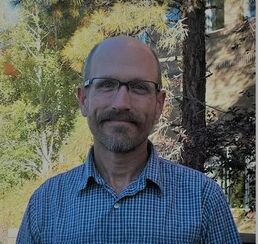
Peter Z. Fulé (he/him)
Professor, Northern Arizona University
Key research themes: Ecological restoration, fire ecology, Cordilleran forest ecology (southwest U.S., northern Mexico)
Overuse of natural resources, fire exclusion, and other human-caused forms of environmental degradation threaten the sustainability of forest ecosystems. Uncharacteristically severe wildfires, pathogen outbreaks, and exotic species invasions are signs of ecological damage in frequent-fire-adapted forests of western North America. Working with colleagues at Northern Arizona University’s School of Forestry and Ecological Restoration Institute, our research focuses on four areas:
- Measuring the extent and characteristics of ecological degradation, including changes in forest structure, plant communities, fire behavior, and habitat components.
- Studying relict sites where recent anthropogenic degradation is minimal, such as remote plateaus in Grand Canyon National Park and isolated sites in northern Mexico.
- Experimentation in alternative methods of restoring natural structure, function, and process to western long-needled pine forests.
- Modeling of vegetation change and fire behavior and effects across stands and landscapes.

Andi Thode (she/her)
Professor of Fire Ecology and Management, School of Forestry, Northern Arizona University
Andi Thode grew up in northern New Mexico. She completed her B.S. (1996) and later her Ph.D. (2005) in fire ecology through the Ecology Graduate Group at the University of California, Davis. She has been heavily involved in the Association for Fire Ecology (AFE) since its’ inception. In 2001 Andi started working as a fire ecologist for the Pacific Southwest Region of the U.S. Forest. In 2005 she left the U.S Forest Service to work at Northern Arizona University (NAU). She is currently a professor of fire ecology and fire science in the School of Forestry at NAU. Her research focuses on fire effects, fire monitoring and landscape level fire severity effects. Andi is the PI for the Southwest Fire Science Consortium and the Director for the Arizona Wildfire Initiative. Andi received her B.S. in Environmental Biology and Management from UC Davis in 1996. She received her PhD in Ecology from UC Davis in 2005.
Graduate Students
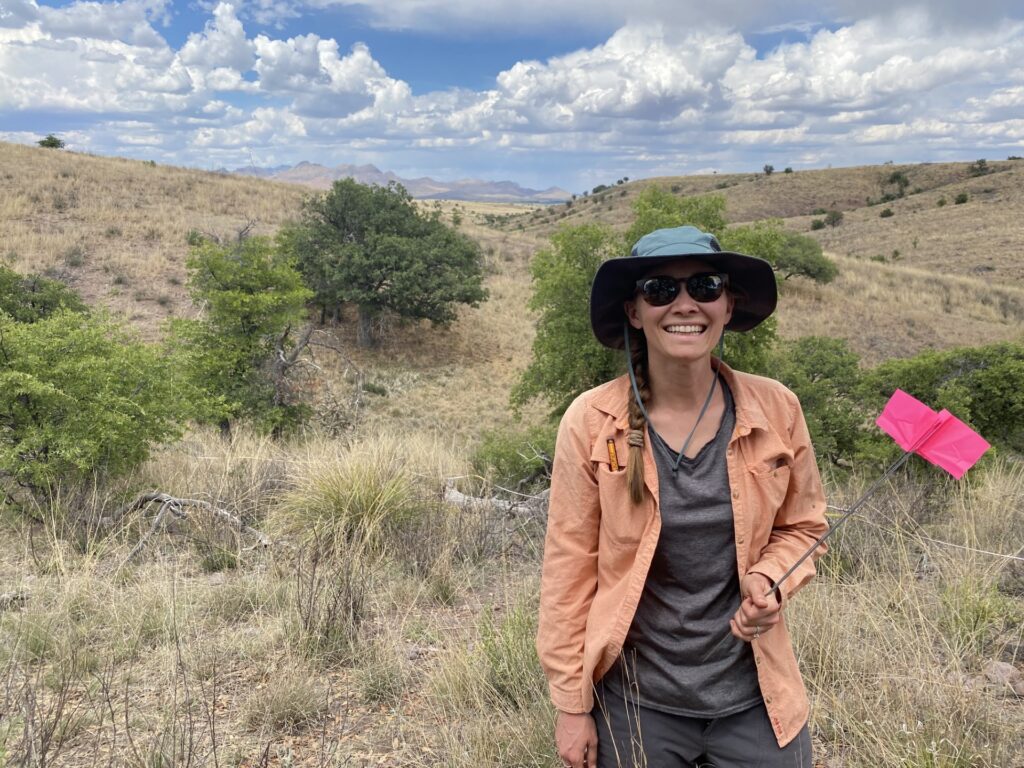
Laura Nicholson (she/her)
PhD in the school of Earth & Sustainability with a concentration in Ecology, Evolution and Conservation Biology, Northern Arizona University
Laura is a PhD student working with Dr. Sara Souther to explore factors influencing Emory oak decline and resilience to inform restoration efforts for this species. Laura is originally from Minnesota, and like most ecologists, grew up loving the outdoors. After watching the climate crisis worsen, she developed a deep desire to try to do something about climate change. Laura is particularly interested in ecological restoration for species of ecological or cultural importance (such as the Emory oak) and to understand the effects of the changing climate on imperiled species. Laura obtained her B.S. in Ecology and Evolutionary Biology from Rice University and her Masters in Wildlife Ecology and Conservation from the University of Florida where she explored the effects of Everglades restoration on an endangered bat species. When Laura isn’t in the field counting trees or behind her desk looking at numbers, she enjoys running with her dogs and baking bread!
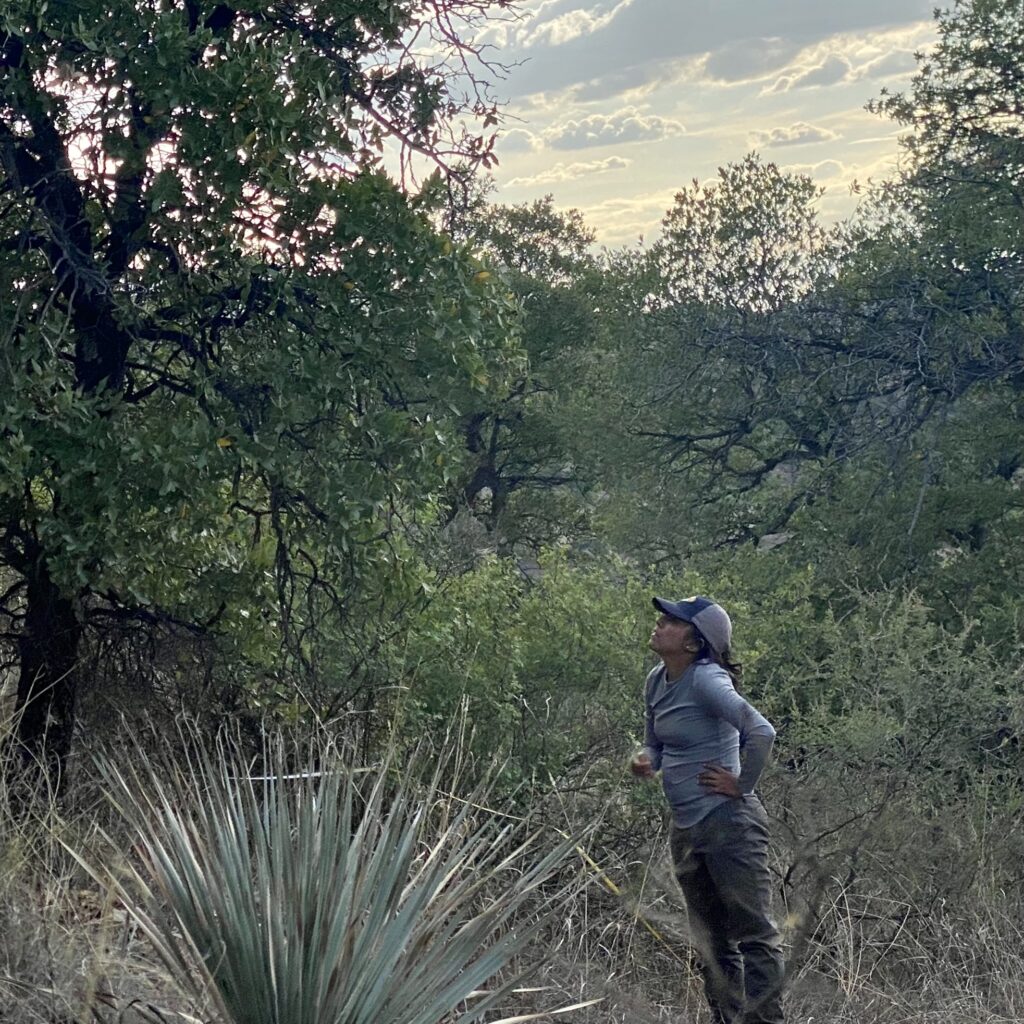
Adriana Garcia Rivera (she/her)
MS Environmental Sciences & Policy, Northern Arizona University
Adriana is a Master’s student working with Dr. Sara Souther. Adriana’s graduate research focuses on identifying constraints on the recruitment of Emory oak, a cultural keystone species for the western Apache tribes. She is combining her interest in wildlife ecology with plant demography to explore landscape-level variation in recruitment across Emory oak’s range, particularly focusing on differences in acorn predation and dispersal rates. Her research will contribute to conservation efforts on Emory oak landscapes and support collaboration between members of several Apache tribes, the U.S. Forest Service, and researchers to preserve Emory oak trees.
2023 field season photos
